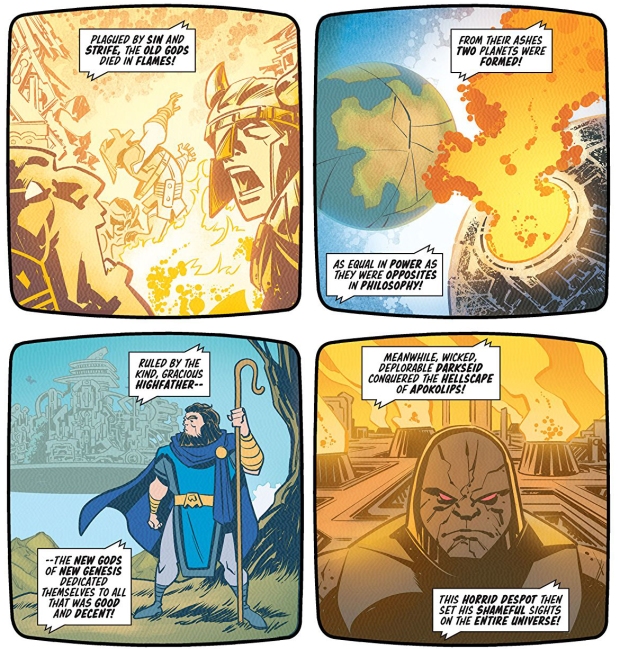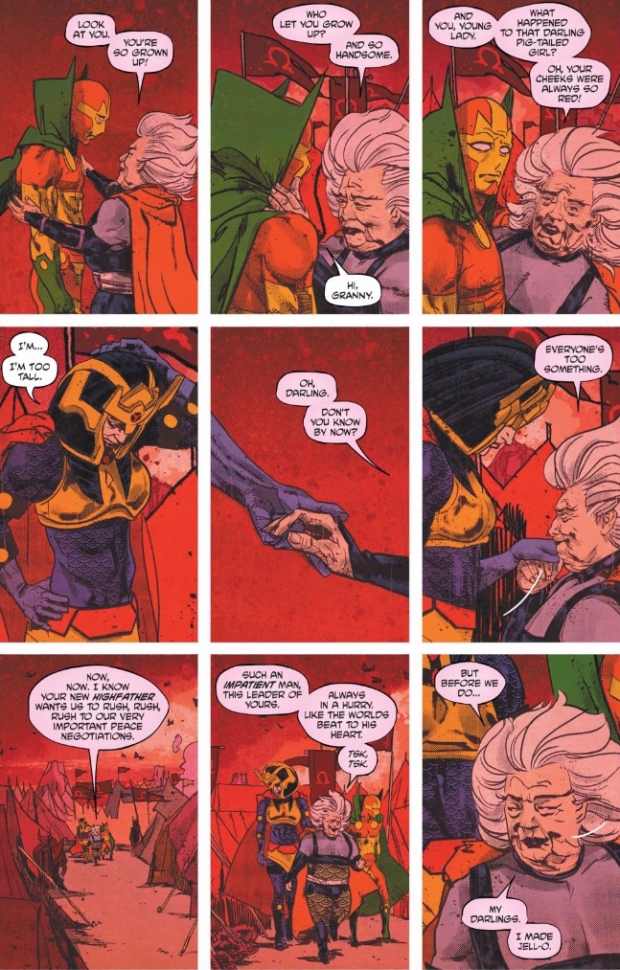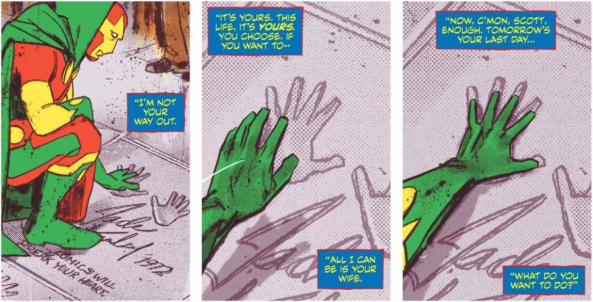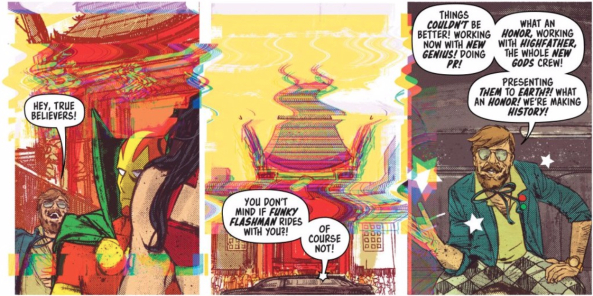by Tom King, Mitch Gerads, and Clayton Cowles
Collects Mr Miracle #1-12 (complete run)
Have you ever been at a theme park and you spend hours in line for a ride that you think will be just the GREATEST, but once you’re on the ride you wonder why did I actually waste hours of my life waiting for this?
That is exactly how I felt about Mister Miracle. After Tom King’s stellar 12 issue run with The Vision (a character I didn’t give much thought or care to until his comic), I was thrilled that Mister Miracle, Big Barda and the New Gods, Jack Kirby’s wacky but wonderful corner of the DC world was going to get the same treatment. But I had a sinking feeling from the first page, and it only went downhill from there – and not in a thrilling rollercoaster way.
Introducing new readers to the New Gods pocket of the DC-verse likely necessitated some amount of exposition, but the first issue also suffers from a decades old “Dear Reader” narrator who quickly becomes insufferable. It’s likely an homage to Jack Kirby (among others, more on that later), but it doesn’t fit at all with King’s attempt at a serious story and Gerads’ similarly dark and metaphor-ridden art.
Soon after our narrator catches us up, we learn Scott has tried to commit suicide in order to “escape death,” and throughout the book, he’s unsure if he actually succeeded or not. This is dark, weighty stuff that also ties in Scott’s trauma of war and his childhood, and it remains unresolved throughout the book. I’m all for thoughtful work (and I hate books that necessitate hand-holding the reader), but at times the cryptic dialogue slipped into abstract, and dare I say, pretentiousness.

The narrator and the dark storyline consistently feel at odds with one another – unless there’s some satire or double meaning that completely escaped me. Which is a shame, because there’s actually some great humor here – for example, when Barda says unironically, “we have to be up so early to kill Granny.”

But the exposition takes a turn at a pivotal moment, when Scott and Barda explain the weapons they’re using against Darkseid. It’s an awful, deus-ex-machina, cop out from old comics that happens twice – no one in their right mind would explain why they’re beating their enemy while they’re doing it. It’s moments like these that brought me out of the story. Is this satire? Is this Scott’s mental illness? Is he actually dead?
Frankly, it felt like poor writing – and I say this fully cognizant of the many five star reviews out there. Maybe I didn’t read it correctly. But there’s a difference between intentionally confusing the reader via the protagonist’s confusion or even mental illness – like Moon Knight, for example -and obfuscating things so much the story becomes so muddled and unenjoyable. (And there’s never an excuse for poorly done exposition.)
I did like the focus on Barda and Scott’s marriage. DC is practically petrified of focusing on a long term relationship, to the point that they’ve tanked every long term couple including Lois and Clark from staying married. Scott and Barda’s banter, arguments, small disappointments and steadfast loyalty in each other – this was the clear highlight of the book for me. King knows how to write a no-nonsense Barda, who is one of my all time DC favorites. But, minor spoiler, Barda always remains second to Scott, and her only real “character development” is becoming pregnant. Again, she could simply be a projection of Scott’s dying mind, but it still left me disappointed.
I also loved Mitch Gerads’ art, even if I didn’t understand or like all of what was going on. His art has a phenomenal sense of mood and texture; it felt immediate and visceral and completely pulls you in. I’m also not sure how he pulls off the glitches and other technical aspects to his art when it also looks painstakingly hand drawn.
As a very moderate fan of Scott, Barda and company thanks to the Justice League Unlimited tv show, this also felt like an unfair introduction to a very wacky but beloved creation of Jack Kirby. Oberon and Granny Goodness in particular never get their due. I wish we could have lived in an updated New Gods world for a first arc, before plunging into Scott’s mental health crisis and “Darkseid is,” whatever the hell that means.

And finally, as if King hasn’t given himself enough to do, he also injects unnecessary commentary about Jack Kirby and Stan Lee’s creative differences. (In a nutshel, Kirby left Marvel for several reasons, signed with DC, and immediately created the New Gods.) This fourth wall breaking is either a complete mystery or a complete distraction, depending on your historical knowledge. If Scott’s mental illness also allowed him to break the fourth wall (a la Deadpool or Gwenpool) it might have been more interesting; or, perhaps, if Scott’s war trauma was tied to Kirby’s experiences as a Jewish officer in WWII. But neither happen, and I still have no idea what it’s for. Like most of the book, frankly.
See some pics below from Mister Miracle #5, thanks to Retcon Punch (and their whole article on the issue is great):


Mister Miracle definitely had some great moments, but they were buried underneath unnecessary exposition, a weighty, confusing story, and early character deaths that made enjoying the story almost impossible. I would have rather just watched the JLU episode “The Ties That Bind” (you can watch a clip here).
